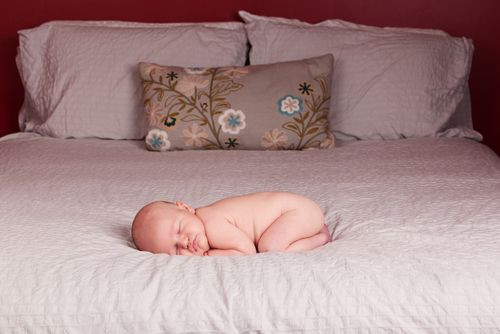New Lifetime Show, Born In The Wild, Chronicles Women Giving Birth Outdoors (And Putting Newborns At Risk)

Television audiences may need an epidural to handle the news that Lifetime, the same network that debuted Project Runway and Drop Dead Diva, has greenlit a reality series centered around mothers who choose to give birth outdoors, which has been aptly named, Born in the Wild.
Asks the show’s press release, “What happens when the craziest experience of a woman’s life becomes truly wild, and soon-to-be parents decide to take on an unassisted birth in the outdoors?” Some obstetricians claim they already know the answer to that question. And little of it is good news, as home births by default are riskier than hospital births. Given the raft of possible complications, many also wonder what effect Born in the Wild will have on the viewing audience, particularly those who may see the decision as a viable method.
“I understand everybody wants to believe we over-medicalize pregnancy and that it’s a natural process,” Dr. Ron Jaekle, a maternal-fetal medicine specialist at the University of Cincinnati Medical Center, told Entertainment Weekly. “But it’s a natural process that historically has caused an extraordinary loss of life.”
Naturalness may be the linchpin of the show’s appeal. The women that signed up did so because they were dissatisfied with their initial experiences at the hospital. They wanted a more natural experience. Lifetime has already expressed that, in order to be eligible for the show, each woman had to be healthy and have one birth already under her belt; first-timers eager to greet the outdoors need not apply.
But “natural” births aren’t automatically safe. For centuries, the two groups with the highest mortality rates were newborns and the mothers who delivered them naturally. Even today, in many developing countries still untouched by modern medicine, these inflated rates hold steady. Data from the World Health Organization show that three quarters of all newborn deaths occur in the first week of life. Worse, nearly half of all mothers and newborns do not receive skilled care during and immediately after birth.
Lifetime contends that it is taking great steps to ensure the women and children of Born in the Wild don’t turn out like third-world births, however. Eli Lehrer, Lifetime’s senior VP and head of nonfiction programming, tells EW that a trained medical professional will be on standby at all times, and the show will never film outside a reasonable radius from a hospital — just in case. Complications could range from women bleeding out, to breeched births, to umbilical cords wrapped around babies’ necks — a phenomenon formally known as “nuchal cord.”
And still, even if someone can swoop in to save a miracle-gone-wrong, and a hospital is within driving distance, and even if both mother and child proceed without hitch, that still leaves ample room for danger, Jaekle argues. In fact, the show’s very success could be what poses the greatest threat to mothers who put faith in the show’s premise. “[The number of children impacted] is a small number — until it’s your kid,” Jaekle told EW. One study found midwife delivery at home results in an average of 12.6 infant deaths per 10,000 births. Meanwhile, midwife delivery in a hospital poses a risk of only 3.2 deaths.
In other words, while on-screen moms may emerge from the wilderness unscathed, who’s to say they won’t influence mothers at home to do the same? It’s not wild speculation: Psychologists have already demonstrated the how influential reality TV can be. Lehrer, meanwhile, remains unconvinced. “I truly don’t think this is something people would enter into lightly. This is a very specific subset of people doing this.” Maybe, but too bad the same thing didn’t happen with Jackass.



























